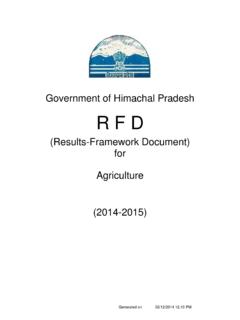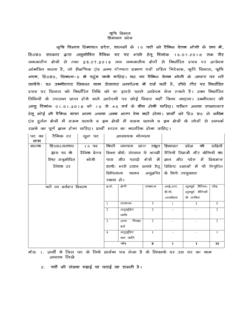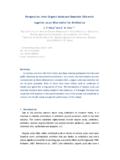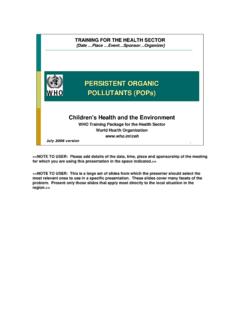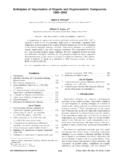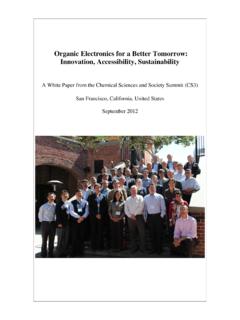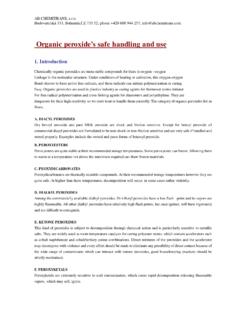Transcription of 1. The Context - Himachal Pradesh
1 1. The Context : Agriculture in Himachal Pradesh is a way of life for the agrarian population and nearly 70% population is directly or indirectly dependent on this sector. Presently, farming and farmers of Himachal Pradesh are passing through a transitional phase, comprising of several factors and processes, which include both constraints and opportunities. The ongoing diversification drive has conclusively proved that economic prosperity of hill farmers lies in growing off season vegetables and production of fruits. This opportunity, however is constrained by increasing input costs and impoverished soils. Farmers are looking for alternatives in view of ever increasing cost of synthetic inputs and poor input output ratio. The vegetable and fruit business of Himachal farmers can transform drastically by adopting organic farming. It is in these areas and for these commodities that certified organic tag or Himachal organic brand will be an important alternative option.
2 This is an sustainable option for maintaining productivity of farm lands also. Integrated farming system is the strength of Hill farming. Agriculture- Animal husbandry are complimentary and supplementary enterprises which provide livelihood to the agrarian population in one hand and reduce dependence on synthetic external inputs on the other. Thus better management of animals, grass lands, farm yard manure hold promise for promotion of organic farming in the State. Large part of the area of Himachal is under pastures, forests and other kinds of wild land, wasteland and support land which is largely used by local farming communities as grazing land, source of fodder, and wild harvest. The forest land and pastures are also habitats of biodiversity and gene pool of wild relatives of many crops. The state of forest and pastures, also determines the level of contribution state makes in capturing carbon which has a direct bearing on the contribution to mitigate ill impacts of climate change.
3 These naturally organic areas holds great potential for conversion to organic . 1|Page The expansion of tourism to rural areas by involving villagers in rural home stays is being promoted in the state. There is an opportunity to add value to home stays by broadening its scope as organic AGRICULTURE TOURISM. organic farmers of Himachal Pradesh and the supporting institutions, such as Department of Agriculture, have to their credit the achievement that organic farming has taken roots in the state. Himachal Pradesh is one of the states in India, where over the past few years farmers, Government and non Government agencies have made significant contributions to the state wide process of organic farming promotion and sustainable development. Low consumption of fertilizers and pesticides, can further facilitate large scale adoption of organic farming with relative ease by the farmers in niche areas.
4 Practical Experience of Himachal Farmers; so far, has demonstrated the usefulness of organic farming to reduce/ replace use of chemical fertilizers and pesticides and reduce the cost of cultivation and improved productive capacity of soils. Based on these experiences, the expectation is that organic farming will be advantageous to the farmers living in all the agro-ecological zones of Himachal Pradesh . The National Missions on sustainable agriculture and horticulture development emphasize promotion of good agriculture practices as necessary components of the agriculture development approaches for which organic farming is the best known tool. Therefore, to put in place an enabling policy framework for promoting organic farming in the state, is the need of the times. Government of Himachal Pradesh has taken several steps towards environmental conservation and sustainable development, such as maintaining green cover, producing clean renewable energy, reducing carbon foot prints etc.
5 ; and these efforts will get further strengthened by adopting organic farming policy. 2|Page 2. Preamble: State would strive for adoption of organic farming practices and will bring about policy changes in agriculture development scenario in order to provide sustainable livelihoods to the farming community through organic farming approaches since it;. i. relies primarily on local, renewable resources, ii. makes efficient use of solar energy and the production potential of biological systems, iii. maintains and improves the fertility of soil;. iv. maximises circulation of plant nutrients and organic matter, v. does not use organisms or substances foreign to nature ( chemical fertilizers, pesticides, GMOs). vi. maintains diversity in the production system as well as the agriculture landscape, vii. integrates farm animals into the system and gives them life conditions that correspond to their ecological role and natural behaviour.
6 Incorporating principles of organic agriculture in Policy: organic agriculture is a unique production management system which promotes and enhances agro- ecosystem health, including biodiversity, biological cycles and soil biological activity, and this is accomplished by using on-farm agronomic, biological and mechanical methods in exclusion of all synthetic off-farm inputs. organic farming as a system avoids or largely excludes the use of synthetic inputs (such as fertilizers, pesticides, hormones, feed additives etc) and to the maximum extent feasible rely upon crop rotations, crop residues, animal manures, off-farm organic waste, mineral grade rock additives and biological system of nutrient mobilization and plant protection . organic is not only about replacing inputs, which is the starting point of the process, it goes beyond, as enshrined in the four principles of organic farming advocated by IFOAM (International Federation of organic Agriculture Movement).
7 3|Page i. Principle of health: organic agriculture should sustain and enhance the health of soil, plant, animal, human and planet as one and indivisible. ii. Principle of ecology: organic agriculture is based on living ecological systems and cycles, work with them, emulate them and help sustain them. iii. Principle of fairness: organic agriculture should build on relationships, that ensure fairness with regard to the common environment and life opportunities. iv. Principle of care: organic Agriculture should be managed in a precautionary and responsible manner, to protect the health and well-being of current and future generations, as well as the environment. Opportunity for addressing poverty alleviation and rural development in Himachal through organic farming: International Alliance for organic Agriculture, set up under the patronage of FAO, by IFOAM and several other agencies, have recognised the potential of organic agriculture sector to contribute to achieving the Millennium Development Goals, one and seven (MDGs.)
8 The first MDG the eradication of extreme poverty and hunger. As a production method, organic agriculture is well suited for resource poor and subsistence farmers, as well as for those who are commercially successful. Since organic agriculture advocates lesser dependence on fossil fuel and more on locally available production assets, farmers work with natural processes and increase cost-effectiveness and resilience of their agriculture systems. It helps them break the vicious cycle of indebtedness for agriculture inputs and helps improve soil fertility in sustainable ways. The seventh MDG is to ensure environmental sustainability. organic agriculture is a promising approach to address the issue of environmental degradation; land, water and air, due to agriculture activities. organic agriculture has potential to contain environmental degradation through improving soil health, enhancing biodiversity and reducing external energy consumption, in addition to improving farmers'.
9 Incomes. organic farming also acknowledges farmers innovations and experiences and integrate indigenous or traditional knowledge with larger agriculture development processes, thereby, showing respect to the farmers as shapers of the future. Since organic farming depends mostly on renewable on-farm resources, it will increase consumption of renewable energy resources in the state and improve agro- 4|Page biodiversity (both varieties and crops). Farmers will again become seed savers thus protecting the heritage of hill agriculture for the future generations. When adopted widely in the state, organic farming may significantly contribute to reducing the food-mileage and carbon foot prints. Recognising this, organic farming is being promoted in the state by organic farmers associations, NGOs and Government agencies, as an appropriate farming approach for farmers, producing for themselves or for the local/ national markets.
10 Under this backdrop, Government in partnership with other stakeholders, is formulating the organic policy of the state, which is comprehensive, futuristic, and valued by all stakeholders. The policy is;. - inheriting the spirit of national vision and approaches about supporting growth of organic farming in India both by Govt and non Govt sector, - building on the growth achieved so far by the organic farmers of the state and the prevailing circumstances for future growth of organic farming in the state, - anticipating policy and services support needs of the organic stakeholders of Himachal Pradesh - Incorporating lessons of successful experiences of innovative global approaches and best practices about organic farming development - distilling spirit of organic agriculture principles enshrined by IFOAM, and - drafted by the organic experts by and debated among organic stakeholders of Himachal Pradesh 3.


